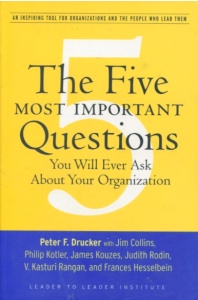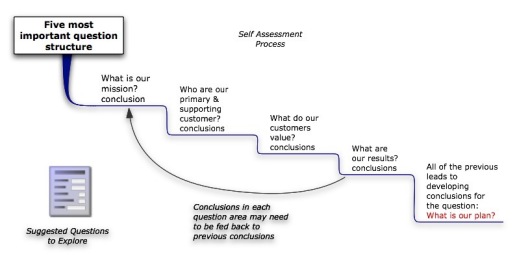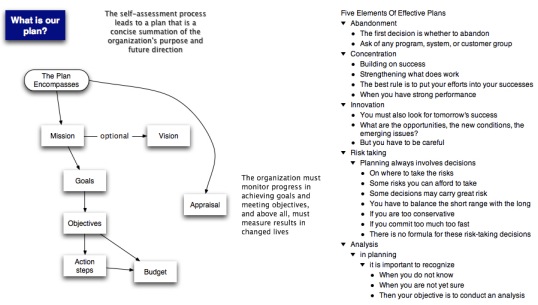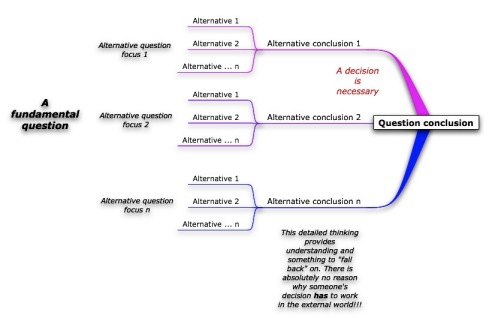The Five Most Important Questions
You Will Ever Ask
About Your Organization
by Peter Drucker
Start here
The framework presented here is in contrast to organizations that: are product (service) driven (inside-out rather than outside-in); charge high prices; are functionally organized; employ hard-sell tactics; splinter efforts; focus on problems/activities rather than opportunities; devote most effort to acquiring new customers rather than keeping existing customers; exist in one time dimension only—yesterday; or rely on bright ideas …

Amazon link: The Five Most Important Questions You Will Ever Ask About Your Organization (J-B Leader to Leader Institute/PF Drucker Foundation)
Also see The Second Half of Your Life
The following is from Amazon.com
With Peter Drucker's five essential questions and the help of five of today's thought leaders, this little book will challenge readers to take a close look at the very heart of their organizations and what drives them.
A tool for self-assessment and transformation, answering these five questions will fundamentally change the way you work, helping you lead your organization to an exceptional level of performance.
Nobody ever asked better questions than Peter Drucker.
All the personality, all the wisdom is here to make your work dramatically more effective.
There's nothing better.
It's like having Peter at your side.—Bob Buford, author, Halftime, GamePlan, Stuck in Halftime and Finishing Well, Founding Chairman, The Peter F. Drucker Foundation for Nonprofit Management"
The Leader to Leader Institute has done a great service in bringing us this monograph. Good leaders come up with answers, but great leaders ask the right questions—and this wonderful work helps all leaders do exactly that."—Jim Collins, author, Good to Great and the Social Sectors"
An amazing resource that can help even the most successful organizations become more successful!"—Marshall Goldsmith, author, What Got You Here Won't Get You There: How Successful People Become Even More Successful, winner of the Harold Longman Best Business Book of 2007"
Peter Drucker's Five Most Important Questions continue to be the indispensable questions an organization must ask itself, regardless of size or sector, if it is determined to be an organization of the future."—Kathy Cloninger, CEO, Girl Scouts of the USA"
At a time when the need for more effective management and more ethical leadership is the moral equivalent of global warming, Drucker's common sense and courage should be modeled by everyone."—Ira A. Jackson, dean, Peter F. Drucker and Masatoshi Ito Graduate School of Management, and board member, The Drucker Institute
Contents: Five Most Important Questions
- 2008 version
- Foreword
- About Peter F. Drucker
- Why Self-Assessment?
- We need management
- The Five Most Important Questions
- Planning Is Not An Event
- Encourage Constructive Dissent
- Creating Tomorrow's Society Of Citizens
- Notes
- The Five Questions
- What Is Our Mission?
- Peter F. Drucker
- Missions Are About Changing Lives
- It Should Fit On A T-Shirt
- Make Principled Decisions
- Keep Thinking It Through
- Jim Collins
- Who Is Our Customer?
- Peter F. Drucker
- Identify The Primary Customer
- Identifying Supporting Customers
- Know Your Customers
- Philip Kotler
- What Does The Customer Value?
- Peter F. Drucker
- Understand Your Assumptions
- What Does The Primary Customer Value?
- What Do Supporting Customers Value?
- Listen To Your Customers
- Jim Kouzes
- What are our results?
- Peter F. Drucker
- Look At Short-Term Accomplishments And Long-Term Change
- Qualitative And Quantitative Measures
- Qualitative measures
- Quantitative measures
- Assess What Must Be Strengthened Or Abandoned
- Leadership Is Accountable
- Note
- Judith Rodin
- What Is Our Plan?
- Peter F. Drucker
- The self-assessment process leads to a plan
- Goals Are Few, Overarching, And Approved By The Board
- Objectives Are Measurable, Concrete, And The Responsibility Of Management
- Five Elements Of Effective Plans
- Abandonment
- Concentration
- Innovation
- Risk taking
- Analysis
- Build Understanding And Ownership
- Never Really Be Satisfied
- Note
- V Kasturi Rangan
- Planning process overview
- Strategy formulation
- A Plan is the Action Agenda
- Central Element Of An Effective Plan
- A Strong Focus on Goals
- Steadfast in Direction, Flexible in Execution
- Ownership and Accountability Placed with Individuals
- Monitoring That Leads to Better Strategy
- Transformational Leadership
- Eight milestones toward a relevant, viable, effective organization
- 1. Scan the environment
- 2. Revisit the mission
- 3. Ban the hierarchy
- 4. Challenge the gospel
- 5. Employ the power of language
- 6. Disperse leadership across the organization
- 7. Lead from the front, don't push from the rear
- 8. Assess performance
- The road ahead
- The Self-Assessment Process
- About the Self-Assessment Tool
- Three phases of self-assessment
- Workbook purposes and action
- How to use this book
- Note
- Suggested Questions To Explore
- Question I: What Is Our Mission?
- What are we trying to achieve?
- What are the significant external or internal challenges, opportunities, and issues?
- Does our mission need to be revisited?
- Question 2: Who Is Our Customer?
- Who are our customers?
- Have our customers changed
- Should we add or delete some customers?
- Question 3: What Does The Customer Value?
- What do our customers value?
- Question 4: What Are Our Results?
- How do we define results for our organization?
- To what extent have we achieved these results?
- How well are we using our resources?
- Question 5: What Is Our Plan?
- What have we learned, and what do we recommend?
- Where should we focus our efforts?
- What, if anything, should we do differently?
- What is our plan to achieve results for the organization?
- What is my plan to achieve results for my group or responsibility area?
- Notes
- Definitions Of Terms
- Action steps
- Appraisal
- Budget
- Customers
- Customer value
- Depth interviews
- Goals
- Mission
- Objectives
- Plan
- Results
- Vision
- About The Contributors
- Jim Coffins
- Philip Kotler
- Jim Kouzes
- Judith Rodin
- V. Kasturi Rangan
- Frances Hesselbein
- About the Leader to Leader Institute
- Acknowledgements
- Additional Resources
Structure of the five most important questions (see third image below for a view of the questioning "brainscape" leading up to conclusions.)

Larger
Composition of the fifth question

Larger
View of the questioning "brainscape"

Larger
Thinking broad and thinking detailed by Edward de Bono
Notes on planning and plans: To further the mission, there must be action today and specific aims for tomorrow.
Yet planning is not master-minding the future.
Any attempt to do so is foolish; the future is unpredictable.
In the face of uncertainties, planning defines the particular place you want to be and how you intend to get there.
Planning does not substitute facts for judgment nor science for leadership.
It recognizes the importance of analysis, courage, experience, intuition—even hunch.
It is responsibility rather than technique.
… snip, snip …
You must adjust the plan when conditions change, results are poor, there is a surprise success, or when the customer leads you to a place different from where you imagined
… snip, snip …
True self-assessment is never finished. Leadership requires constant resharpening, refocusing, never really being satisfied
|
![]()

![]()